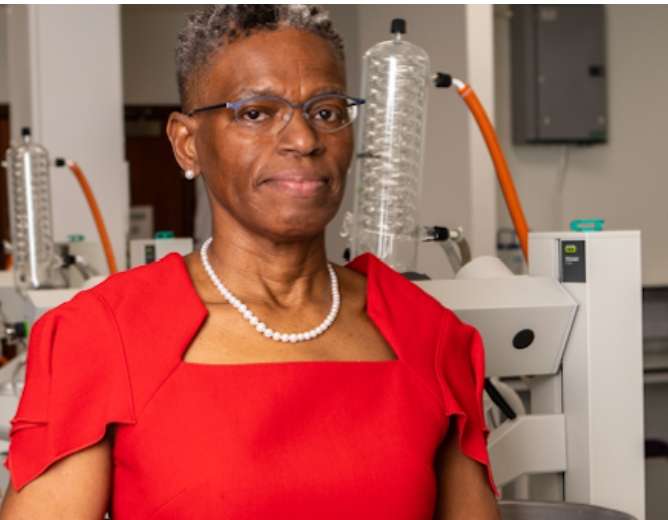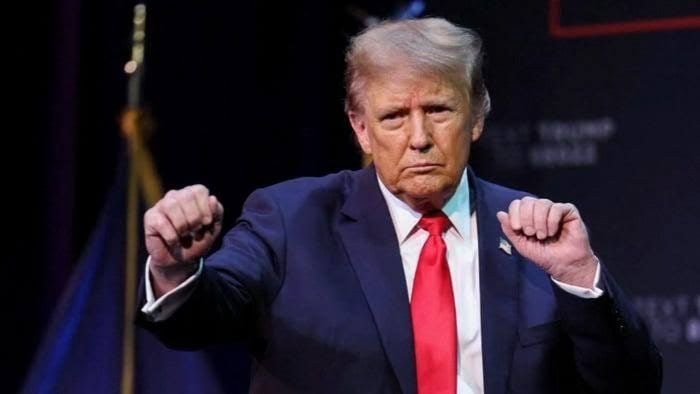Headline
Cambridge Varsity Announces Nigerian Professor As Seventh President

The University of Cambridge has announced a Professor of Pharmaceutical Nanoscience, Ijeoma Uchegbu, as the seventh President of Wolfson College, one of its 31 colleges.
This was made known in a statement titled, “Wolfson elects Professor Ijeoma Uchegbu as the College’s 7th President on the University’s website.”
Uchegbu, who will succeed the current President, Professor Jane Clarke, on October 1, 2024, is known for her ground-breaking work in nanoparticle drug delivery.
The Nigerian professor currently lectures at University College London.
READ ALSO: Musician Commits Suicide, Alleges Wife’s Infidelity
The statement read, “We are delighted to announce that Professor Ijeoma Uchegbu, a ground-breaking nanoscientist, has been elected as Wolfson’s seventh President.
“Professor Ijeoma Uchegbu, a Professor of Pharmaceutical Nanoscience known for her ground-breaking work in nanoparticle drug delivery, will become the 7th President of Wolfson. She will succeed the current President, Professor Jane Clarke, on 1 October 2024.
“Professor Uchegbu is currently a Professor of Pharmaceutical Nanoscience at University College London. Her pioneering work on the mechanisms of drug transport has led to the development of new treatments which promise to transform pain relief, including the enkephalin pain medicine candidate (EnveltaÔ), designed to address the opioid crisis.
“Her work has won her numerous awards, fellowships and accolades, and she holds positions on several academic boards and councils including the Wellcome Trust, the Academy of Medical Sciences and is an honorary Fellow of the Royal Society of Chemistry.
READ ALSO: TV Star, Matthew Perry Died Of Accidental ketamine Overdose, Autopsy Reveals
“She has also played a leading role during her time at UCL as Pro Vice Provost for Africa and the Middle East, in forging new research partnerships in those regions and as UCL’s Provost’s Envoy for Race Equality, steering the organisation’s race equality agenda.
Responding, Uchegbu said, “I am so thrilled to be joining Wolfson College, an ambitious and forward-thinking College.
“It will be an honour to lead such a lively, diverse and engaged student community in an environment where people are stimulated culturally, socially and intellectually. I look forward to working with the Governing Body, staff and students to help realise their ambitions and potential.”
Meanwhile, the current President, Professor Clarke, said, “I congratulate Ijeoma for being elected President of Wolfson College. If she finds being the leader of the ‘Wolfpack’ half as rewarding as I have, then I can assure her that she will enjoy herself immensely.”
Uchegbu was raised in South East Nigeria and Hackney. She completed her pharmacy studies at the University of Benin in 1981 before attending the University of Lagos to obtain her master’s degree.
After returning to the UK, she studied postgraduate work at the University of London, earning a PhD in 1997. Alexander (Sandy) Florence, the Dean of the School of Pharmacy, supervised her dissertation. From 2002 to 2004, she worked as a lecturer at the University of Strathclyde.
Headline
Russia, China Afraid Of US Under My Administration — Trump

United States President, Donald Trump, has said Russia and China fear the United States because of the strength of his administration, arguing that American global influence is driven primarily by its military power and leadership.
Trump, in a post on Truth Social on Wednesday stated that rival powers would not take NATO seriously without the United States, claiming the alliance lacks deterrent force in the absence of American involvement.
He expressed doubts about whether NATO members would come to the aid of the US in a real crisis, despite Washington’s continued commitment to the alliance.
READ ALSO:Trump To Withdraw US From 66 UN, International Organisations
The president credited his leadership with rebuilding the US military during his first term and sustaining its strength, describing this as the key reason adversaries show respect and caution toward the country.
He maintained that America’s military dominance has played a central role in preserving global stability and saving lives.
Trump also argued that his administration forced NATO members to increase defence spending, saying many allies had previously failed to meet financial commitments while relying heavily on the US.
READ ALSO:Insecurity: US Congressman Riley Moore Reveals Trump’s Mission In Nigeria
He added that his actions helped prevent further escalation in Eastern Europe and contributed to the resolution of multiple conflicts.
According to Trump, the United States remains the only nation that commands genuine fear and respect from both Russia and China, a position he attributed to his administration’s approach to defence, diplomacy, and global leadership.
“He wrote partly, “The only Nation that China and Russia fear and respect is the DJT REBUILT U.S.A. MAKE AMERICA GREAT AGAIN!!! President DJT.”
Headline
Trump To Withdraw US From 66 UN, International Organisations

United States President, Donald Trump, has announced plans to withdraw the US from 66 United Nations and international organisations, including key global bodies focused on climate change, peace and democracy.
The decision was disclosed in a presidential memorandum released by the White House on Wednesday evening, following a review of which “organizations, conventions, and treaties are contrary to the interests of the United States.”
According to Trump, the move will see the US end its participation in the affected organisations and cut all related funding.
A list shared by the White House showed that 35 of the organisations are non-UN bodies, including the Intergovernmental Panel on Climate Change (IPCC), the International Institute for Democracy and Electoral Assistance, and the International Union for Conservation of Nature.
READ ALSO:Trump’s Airstrikes: Halt Military Cooperation With US Immediately – Sheikh Gumi Tells Tinubu Govt
Although listed as a non-UN body by the White House, the IPCC is a United Nations organisation that brings together leading scientists to assess climate change evidence and provide periodic reports to guide political leaders.
The memorandum also announced the US withdrawal from 31 UN entities, including the UN Framework Convention on Climate Change (UNFCCC), the UN Democracy Fund, and the UN Population Fund (UNFPA), which focuses on maternal and child health.
Several of the targeted UN bodies are involved in protecting vulnerable groups during armed conflicts, including the UN Office of the Special Representative of the Secretary-General for Children and Armed Conflict.
Reacting to the announcement, UN spokesperson Stephane Dujarric said in a note to correspondents on Wednesday evening that the organisation expected to issue a response by Thursday morning.
Despite repeatedly stating his desire to limit US involvement in UN forums, Trump has continued to exert influence on international decision-making.
READ ALSO:Trump Using FBI To ‘Intimidate’ Congress, US Lawmakers Cry Out
In October last year, he threatened to impose sanctions on diplomats who formally adopted a levy on polluting shipping fuels that had already been agreed to at an earlier meeting, a move that stalled the deal for 12 months.
The Trump administration also sanctioned UN special rapporteur Francesca Albanese after she released a report detailing the role of international and US companies in Israel’s genocidal war on Gaza.
During his first term in 2017, Trump similarly threatened to cut aid to countries that supported a draft UN resolution condemning the US decision to recognise Jerusalem as Israel’s capital.
As a permanent member of the UN Security Council, the US wields significant influence at the United Nations, including veto power, which it has repeatedly used to block efforts to end Israel’s war on Gaza before later mediating a ceasefire.
(Aljazeera)
Headline
UK Supported US Mission To Seize Russian-flagged Oil Tanker – Defense Ministry

The British Ministry of Defence said on Wednesday that it provided support to the United States in its operation to seize a Russian-flagged oil tanker in the North Atlantic.
US seized the tanker, which was being shadowed by a Russian submarine on Wednesday, after pursuing it for more than two weeks across the Atlantic as part of Washington’s efforts to block Venezuelan oil exports.
According to Britain, its armed forces gave pre-planned operational support, including basing following a US request for assistance.
READ ALSO:UK Introduces Powers To Seize Phones, SIM Cards From Illegal Migrants
The UK also said a military vessel provided support for the US forces pursuing the tanker, and the Royal Air Force provided surveillance support from the air.
Defence Secretary John Healey stated that the operation targeted a vessel with a nefarious history linked to Russian and Iranian sanctions evasion networks.
“This action formed part of global efforts to crack down on sanctions busting,” he said in a statement.
READ ALSO:Venezuelan Deportees: US Embassy Gives Reason For Reducing Visa Validity For Nigerians
According to him, the US was Britain’s closest defence and security partner.
“The depth of our defence relationship with the US is an essential part of our security, and today’s seamlessly executed operation shows just how well this works in practice,” he added.
The British government said that the Bella-1 tanker, now renamed Marinera, is sanctioned by the US under its counter-Iran sanctions,
The MoD statement said the support was provided in full compliance with international law.

 News5 days ago
News5 days agoWhat I Saw After A Lady Undressed Herself — Pastor Adeboye

 Headline5 days ago
Headline5 days agoPROPHECY: Primate Ayodele Reveals Trump’s Plot Against Tinubu

 Metro5 days ago
Metro5 days agoArmed Robbers Shot PoS Operator To Death In Edo

 Business3 days ago
Business3 days agoNNPCL Reduces Fuel Price Again

 Metro4 days ago
Metro4 days agoAAU Disowns Students Over Protest

 Metro5 days ago
Metro5 days agoJoint Task Force Kills 23 Bandits Fleeing Kano After Attacks

 Metro4 days ago
Metro4 days agoEdo: Suspected Kidnappers Kill Victim, Hold On To Elder Brother

 Politics5 days ago
Politics5 days ago2027: Rivers APC Pledges To Follow Wike’s Instructions

 Metro4 days ago
Metro4 days agoNine Soldiers Feared Dead In Borno IED Explosion

 Headline2 days ago
Headline2 days agoRussia Deploys Navy To Guard Venezuelan Oil Tanker Chased By US In Atlantic






























